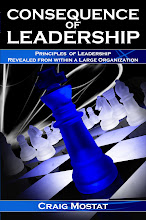"Inventories can be managed but people must be led" - Ross Perot.
This is leadership 101 - "leadership for dummies." Fundamental? Obvious? Should be, but surprisingly not all that common.
While inventory is inanimate, people have their own self-will, hopes, dreams and ideas. They [people] come with unique personalities and talents or gifting. All of this is problematic for managers, but invigorating for leaders.
Consider these contrasts:
- Procurement of inventory at the cheapest price possible is desirable, but not a winning strategy with people.
- Holding the least amount of inventory possible in order to increase turnover is a wise yet the complete opposite of what you would do with people.
- All inventory decreases in value over time (exceptions: wine, cheese, collectable memorabilia); this is completely opposite with people.
The "people" of the business are considered a cost of the business, listed on any profit & loss statement after sales and margin just before operating costs.
In Jim Collins' best seller "Good to Great," he outlines how great companies consider first "who" then "what." Here is his summary of this concept:
The good-to-great leaders began the transformation by first getting the right people on the bus (and the wrong people off the bus) and then figured out where to drive it. The key point is that "who" questions come before "what" decisions – before the vision, before strategy, before organizational structure, before tactics.
This is going to drive the accountants batty; what if salaries (people) were listed at the beginning of the P&L, before sales and margin vs. a cost that must be reckoned with? What if business operated like a sports team, which decides the amount of payroll it is going to spend and acquires the team as the most important part of the enterprise?
I can't imagine that anyone would dispute the importance of people to any organization. Most would not deny the findings of Jim Collins in "Good to Great." There are endless stories of both managers that failed because they treated their people like machines, and leaders that succeeded through inspiring and positively influencing their people. With the overwhelming evidence in support of putting people first in the organization, why is it so uncommon?




No comments:
Post a Comment